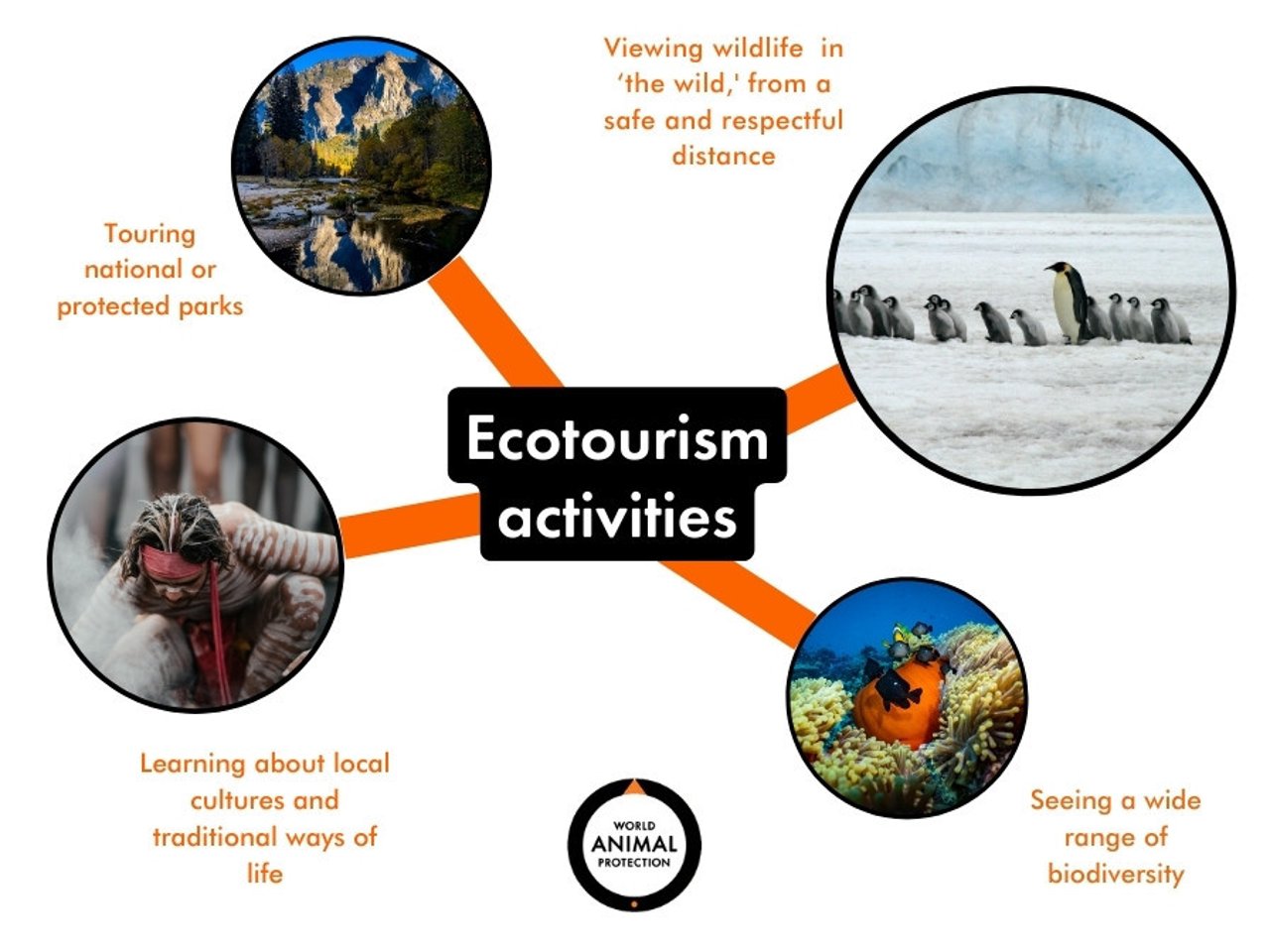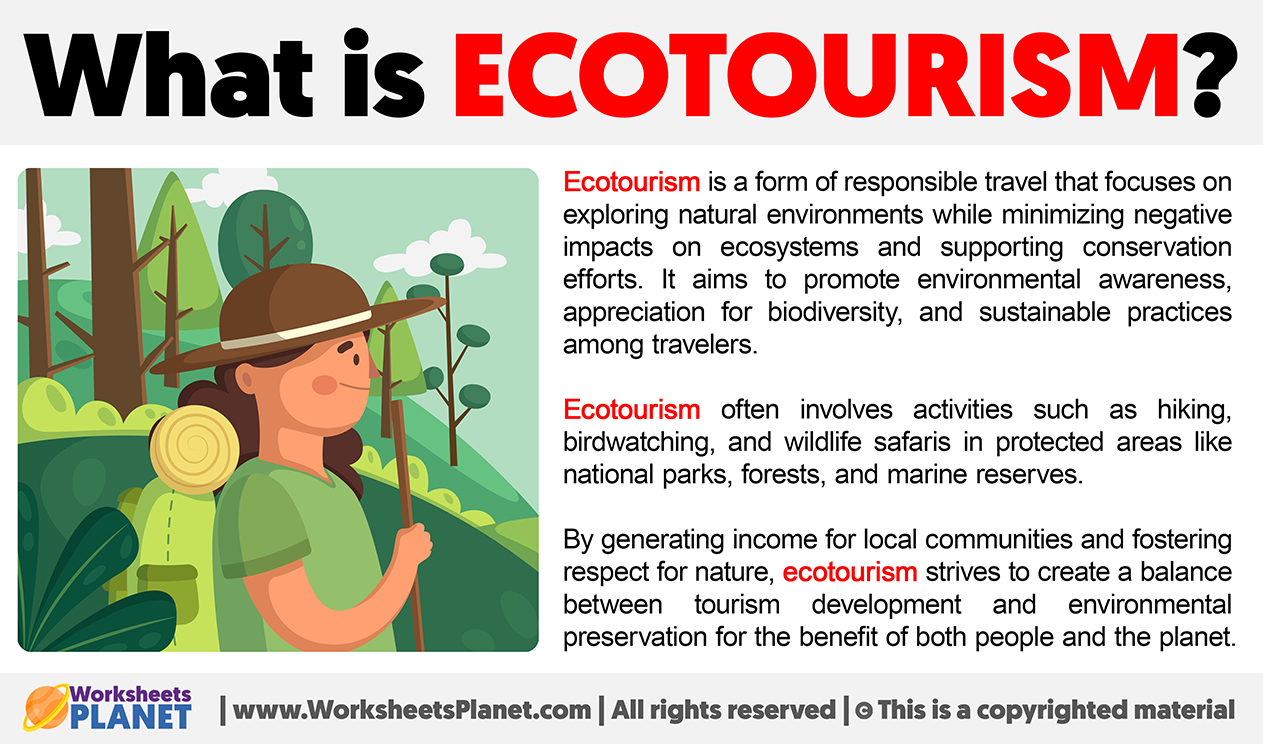“`html
Eco-tourism: A Sustainable Approach to Travel
Eco-Tourism: A Sustainable Approach to Travel
In an era marked by increasing environmental awareness and a growing desire for authentic travel experiences, eco-tourism has emerged as a significant force within the global tourism industry. More than just a buzzword, eco-tourism represents a paradigm shift in how we approach travel, emphasizing responsible practices that minimize environmental impact while maximizing benefits for local communities. This article delves into the multifaceted nature of eco-tourism, exploring its core principles, diverse forms, benefits, challenges, and the crucial role it plays in shaping a more sustainable future.
Defining Eco-Tourism: Beyond Greenwashing
Eco-tourism, at its heart, is about traveling responsibly to natural areas, conserving the environment, and improving the well-being of local people. It’s a form of tourism inspired primarily by nature, where the primary motivation is the observation and appreciation of nature and the traditional cultures prevailing in natural areas. Unlike mass tourism, which often prioritizes profit over environmental and social considerations, eco-tourism strives to create a harmonious balance between tourism development and conservation.

The International Ecotourism Society (TIES) defines ecotourism as “responsible travel to natural areas that conserves the environment and improves the well-being of local people.” This definition highlights the three pillars of eco-tourism:
Environmental Conservation:
Minimizing the negative impacts of tourism on natural environments, including wildlife, habitats, and ecosystems.
Community Benefits:

Ensuring that local communities directly benefit from tourism activities, through economic opportunities, cultural preservation, and empowerment.
Responsible Travel:
Promoting ethical and sustainable practices among tourists, including education, awareness, and respect for local cultures and environments.
It’s crucial to distinguish genuine eco-tourism from “greenwashing,” where companies falsely promote their products or services as environmentally friendly. True eco-tourism involves measurable actions and transparent practices that demonstrate a genuine commitment to sustainability.
The Principles of Eco-Tourism
Several core principles guide the practice of eco-tourism, ensuring its effectiveness in promoting sustainability:
Minimize Impact:
Eco-tourism operations strive to reduce their environmental footprint through measures such as waste reduction, energy efficiency, and low-impact transportation.
Build Environmental and Cultural Awareness:
Educating tourists about the natural and cultural values of the destinations they visit, fostering a deeper understanding and appreciation.
Provide Direct Financial Benefits for Conservation:
Generating revenue that directly supports conservation efforts, such as park management, habitat restoration, and wildlife protection.
Provide Financial Benefits and Empowerment for Local People:
Creating economic opportunities for local communities through employment, entrepreneurship, and the sale of local products and services.
Respect Local Culture:
Promoting cultural exchange and understanding, respecting local customs, traditions, and knowledge.
Support Human Rights and Democratic Movements:
Advocating for ethical and responsible tourism practices that respect human rights and support democratic principles.
Diverse Forms of Eco-Tourism
Eco-tourism encompasses a wide range of activities and experiences, catering to diverse interests and preferences. Here are some examples:
Wildlife Tourism:
Observing and appreciating wildlife in their natural habitats, such as safaris, birdwatching, and whale watching. Responsible wildlife tourism prioritizes animal welfare and minimizes disturbance to wildlife.
Nature-Based Tourism:
Exploring and enjoying natural landscapes, such as hiking, trekking, and kayaking. This form of eco-tourism emphasizes low-impact activities and respect for natural environments.
Cultural Tourism:
Experiencing and learning about the cultural heritage of local communities, such as visiting traditional villages, participating in cultural festivals, and learning about local crafts and customs.
Agro-Tourism:
Visiting and participating in agricultural activities, such as working on farms, learning about sustainable agriculture practices, and tasting local produce. Agro-tourism provides opportunities for cultural exchange and supports rural economies.
Volunteer Tourism (Voluntourism):
Combining travel with volunteer work in conservation or community development projects. It’s important to ensure that voluntourism projects are ethical and beneficial to local communities.
The Benefits of Eco-Tourism
Eco-tourism offers a multitude of benefits, both for the environment and for local communities:
Environmental Benefits:
Conservation of natural habitats and biodiversity.
Reduced pollution and waste.
Increased awareness and appreciation of nature.
Funding for conservation projects.
Social and Economic Benefits:
Economic opportunities for local communities.
Cultural preservation and revitalization.
Empowerment of local people.
Improved infrastructure and services.
Increased cultural exchange and understanding.
Educational Benefits:
Increased knowledge and awareness of environmental and cultural issues.
Promotion of responsible travel practices.
Fostering a sense of connection with nature.
Challenges and Considerations
Despite its numerous benefits, eco-tourism faces several challenges:
Greenwashing:
The misuse of eco-tourism labels for marketing purposes, without genuine commitment to sustainability.
Leakage:
The loss of tourism revenue to external businesses, rather than benefiting local communities.
Over-Tourism:
The negative impacts of excessive tourist numbers on fragile ecosystems and local cultures.
Lack of Regulation:
The absence of clear standards and regulations for eco-tourism practices in some regions.
Impact on Vulnerable Cultures:
The potential for cultural commodification and loss of traditional practices.
Addressing these challenges requires a collaborative effort from governments, tourism operators, local communities, and tourists themselves.
The Role of Tourists in Eco-Tourism
Tourists play a crucial role in the success of eco-tourism. By making responsible choices, tourists can contribute to the conservation of natural environments and the well-being of local communities. Here are some ways tourists can support eco-tourism:
Choose Responsible Tour Operators:
Select tour operators that demonstrate a commitment to sustainability and ethical practices.
Respect Local Cultures:
Learn about local customs and traditions, and show respect for local people and their way of life.
Minimize Environmental Impact:
Reduce waste, conserve water and energy, and avoid disturbing wildlife.
Support Local Businesses:
Purchase local products and services, and dine at local restaurants.
Educate Yourself:
Learn about the environmental and cultural values of the destinations you visit.
Travel in Small Groups:
Minimize your impact on fragile ecosystems and local communities.
Be a Responsible Consumer:
Avoid purchasing products made from endangered species or unsustainable materials.
The Future of Eco-Tourism
Eco-tourism is poised to play an increasingly important role in the future of travel. As environmental awareness continues to grow, and as travelers seek more authentic and meaningful experiences, eco-tourism offers a sustainable and enriching alternative to mass tourism. By embracing the principles of responsible travel, conservation, and community benefits, eco-tourism can contribute to a more sustainable and equitable world.
The future of eco-tourism relies on strong partnerships between stakeholders, including governments, tourism operators, local communities, and tourists. By working together, we can ensure that eco-tourism remains a force for good, protecting our planet and empowering local communities for generations to come.
“`



